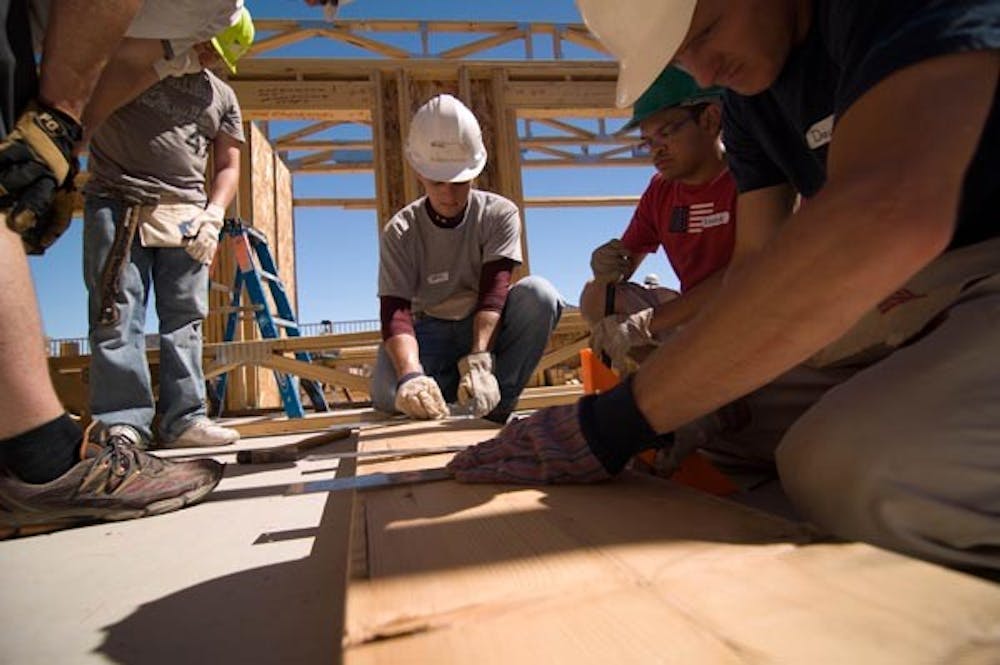From crunching numbers to hammering nails, students took a break from the business side of housing to lend a hand to Habitat for Humanity.
Volunteers from ASU’s Beta Alpha Psi and the Department of Information Systems Club met Saturday to collaborate with workers from Habitat for Humanity, laying down the foundation for a new home and life for one Phoenix family.
Habitat for Humanity is a nonprofit Christian organization that builds affordable houses for low-income families.
State Press Television By Kathryn Mykleseth
“For the family to build alongside someone they have never met, someone who is coming out to give up their time and their energy to help them, [the volunteers] are changing their life,” said Liz Pabst-Wanless, corporate relations manager for Habitat for Humanity Central Arizona.
The mission of the Department of Information Systems Club, which has been a part of ASU since 1999, is to provide career development opportunities to students, as well as have them work hands-on with the community, said David Roman, the club’s president.
“Social responsibility creates a higher impact around you by showing your dedication past yourself,” said Roman, a music composition and computer information systems senior.
As the spearhead for the group, he approached Habitat for Humanity about a joint project with PricewaterhouseCoopers, a consulting and human resource service that helped sponsor the event. His idea for a dynamic collaboration with other ASU organizations soon grew.
Beta Alpha Psi, a national honor society open to accounting, finance and computer information majors, was eager to form a partnership with the Department of Information Systems Club.
“I wanted to give our members the opportunity to get out there and be part of the build, be able to network and do something positive in the community,” said Isaiah McCoy, president of Beta Alpha Psi.
The family of three — Maricella Letona-Martinez and her children Gabriel, 6, and Lindsay, 13 — was selected for this new home after suffering through great hardship.
The now-single mother lost her house after her husband passed away from cancer. The family is currently sharing a bedroom in Maricella’s mother’s home, which is overcrowded with three other tenants.
“She is the strongest, most inspirational women I have ever met,” Pabst-Wanless said.
With a foreclosure rate of less than 1 percent, the Habitat homes are an affordable solution to families who don’t have a safe place to live, Pabst-Wanless said.
Last year, the Habitat for Humanity chapter at ASU campus built 41 homes and is hoping to complete 50 new homes this year.
Habitat for Humanity Central Arizona has partnered to build or renovate more than 780 homes across 13 Valley communities.
The Oro Vista community located in South Phoenix was the destination for the Letona-Martinez home. The site is a Habitat community, and is comprised of 32 homes, with the final four homes now in construction.
“All of these families are Habitat families and they have built their houses alongside each other,” Pabst-Wanless said.
Families interested in acquiring a Habitat home must adhere to strict requirements and guidelines, she said. The families have to earn 30 to 60 percent of the median income, live in substandard housing and have good credit.
“They are agreeing to become homeowners, agreeing that they will actually pay a mortgage interest-free and also agree that they will put in 400 hours of volunteer work,” she said.
The agreement, called “sweat equity,” involves a 100-hour volunteer commitment on someone else’s home and 300 hours on their own. This is to ensure the family really knows every nook and cranny of their new home, Pabst-Wanless said
“They will learn what it means to really be a homeowner and all the maintenance that comes with it,” she said.
Habitat receives funding from the government with land purchases coming mainly from miscellaneous grants and donations, Pabst-Wanless said.
“Community service is really one of the foundational principles that we learn in college,” McCoy said. “Everyone has to contribute some way, shape or form.”
Reach the reporter at amoswalt@asu.edu





